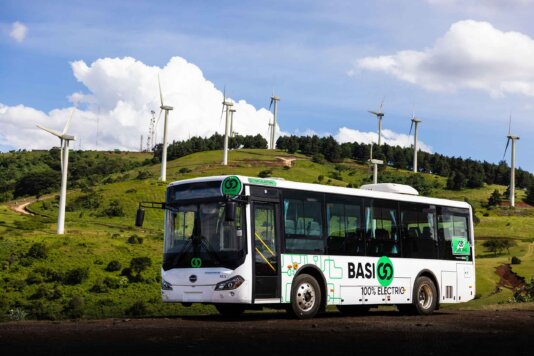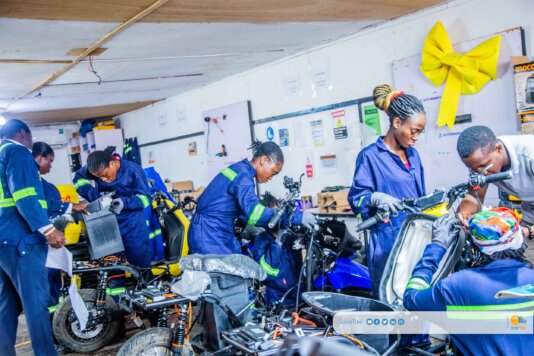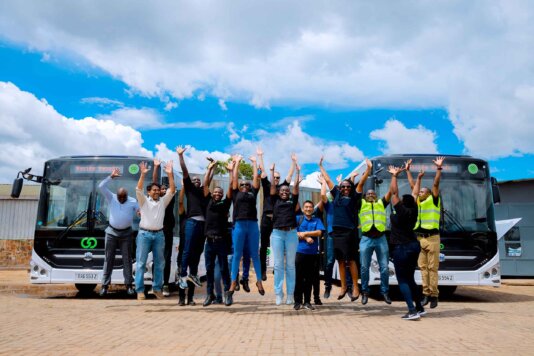- About
- Topics
- Picks
- Audio
- Story
- In-Depth
- Opinion
- News
- Donate
-
Signup for our newsletterOur Editors' Best Picks.Send
Read, Debate: Engage.
| January 16, 2024 | |
|---|---|
| topic: | Renewables |
| tags: | #electric vehicles, #renewable energy, #climate action, #Rwanda, #Africa, #Kenya |
| located: | Rwanda, Kenya, Uganda, Tunisia |
| by: | Bob Koigi |
The cyclical increase in fuel prices, the demand for cost-effective transportation and environmental concerns have sparked an electric vehicle revolution in Africa. Meanwhile, countries across the world are exploring innovative ways to decarbonise road transport, which currently contributes to 15 per cent of global emissions.
Governments and private sector players in Africa are striving to carve out a share in the rapidly growing electric vehicle sector, which is expected to reach USD 21.39 billion by 2027, up from USD 11.94 billion in 2021. This meteoric rise introduces both opportunities and challenges.
Rwanda, for instance, has been a frontrunner in the transition to EVs, introducing a raft of policy interventions and incentives in a bid to woo investors. These have included providing rent-free land for charging stations, reducing electricity tariffs for electric vehicles and exempting electric cars and spare parts from VAT, import and excise duties.
Tunisia, on its part, has slashed custom duties on electric vehicle charging equipment to 10 per cent, while reducing VAT by 7 per cent.
Uganda, which produced the first electric bus in Africa in 2016, has also waived import duty on two and three electric wheelers while exempting VAT on all electric vehicles. It has also introduced a special electricity tariff on charging stations.
The nation's private sector, meanwhile, has stepped up its resolve to embrace green mobility through partnerships with government and entering into the local assemblage of vehicles with little-to-zero tailpipe emissions.
In Kenya, up to 40 local e-mobility startups have raised USD 52 million in financing, representing the highest figure in the continent.
These startups provide a range of services, including local assembly and sales, asset financing and battery-as-a-service, among others.
BasiGo is one of them. Having started its operations in 2022 by piloting with two mass transit buses, the green mobility startup has now increased its fleet to 17.
Cumulatively, the buses traveled over a million kilometers, carried more than 1.3 million passengers and prevented the release of over 200 tonnes of carbon dioxide.
"Kenya, and by extension Africa, is ready for the green mobility revolution," Moses Nderitu, Chief Revenue Officer at BasiGo, told FairPlanet.
"When we first ventured into the market and rolled out the mass transit buses, we thought the excitement by passengers was because it was a novel idea. But two years down the line, the enthusiasm is still there. More commuters prefer electric buses to diesel-powered ones.
"We currently have a waiting list of 400 buses from operators. They wouldn't be requesting them if the demand was not there."
Furthermore, to streamline clean transport through mass transit buses, BasiGo has installed three electric charging stations and hopes to open seven by the end of 2024.
It is working with an oil marketing company to imcorporate charging stations at the oil marketer’s petrol stations, which will allow buses to charge at night when less electricity is used.
Ultimately, the firm hopes to start assembling the buses locally and operate 1,000 electric buses in Kenya by 2026, even as it scales operations in Rwanda and, eventually, in other African countries.
"For the last one year, e-mobility in Kenya has moved from something on the fringes to a topic that is being discussed at the highest level with the president aggressively championing the adoption of clean vehicles," Nderitu said. "That tells you that the future of mobility is green."
SolarTaxi, a Ghana-based startup offering clean and green commuting solutions, also assembles and maintains electric vehicles, including cars, bikes and tricycles. Since its inception in 2018, the company's services have expanded to include the installation of charging units, the manufacturing of battery packs and bike conversion.
To power its operations, the startup has trained some 100 women in mechanical and auto engineering through its female engineering academy. The women are responsible for handling the assembling and maintenance of the EVs and charging units.
"We are committed to contributing to a clean and healthy environment through sustainable transportation," Jorge Appiah, CEO of SolarTaxi, told FairPlanet.
"The desire to empower women, evident in our workforce and training programmes, adds a crucial social dimension to our mission."
The e-mobility company maintains seven branches in Ghana and has extended operations to Nigeria and Cote d' Ivoire to meet the growing demand.
"We have observed a growing awareness and acceptance of electric vehicles in the market, driven by environmental concerns, rising fuel prices, and most importantly, the need for cost-effective transportation solutions," Appiah noted.
However, it hasn't always been a smooth ride for players in the sector. The upfront cost of acquiring electric vehicles and the prohibitive charging infrastructure have made them unpopular with a section of customers.
According to a report by the Shell Foundation, up to USD 9 billion will be required to finance a sustainable market for electric two wheelers in Kenya, Nigeria, Uganda, Rwanda and Ethiopia by 2030.
"Electric two wheeler assemblers / importers are unable to import at scale because they cannot meet upfront payments," the report reads.
In countries like Kenya, which are considered trailblazers in the electric vehicle field on the continent, limited investment has put the brakes on the scale of EV manufacturing, despite the large number of companies that have launched operations there.
But companies in that space have become innovative to boost production. For instance, BasiGo has introduced a financing model called 'pay as you drive,' allowing owners to pay for electric buses as they use them, rather than paying the entire amount upfront.
They pay BasiGo based on the kilometers they drive each day. One can also opt to purchase the bus without a battery, which consumes the lion share of the final purchasing cost.
The other option is to pay a deposit and the balance through agreed terms and acquire the bus plus the battery.
SolarTaxi, on the other hand, has introduced various affordable solutions for those who cannot buy the vehicles upfront. This includes a renting option, which is reserved for their electric bikes. Those interested can rent the two wheelers at an agreed amount and period.
The lease-to-own option, on the other hand, allows users to lease an electric car for a predetermined period with agreed payment terms. At the end of the lease period, they can purchase the vehicle at a predetermined price.
Players have recommended other financing models, like tapping into the carbon markets, to make EVs affordable.
"If someone is using 80 per cent renewable energy and the bus is mitigating 50 tonnes of carbon every year, and we monetise that carbon once the fleet is big, we will have made renewable energy in public transport attractive considering 60 per cent of journeys in countries like Kenya are made by public vehicles," Nderitu noted.
Players have also grappled with poor infrastructure, such as lack of adequate power, power outages and inadequate charging stations. BasiGo says it is working with public utility companies to increase charging stations and charging vehicles at night when consumption of electricity is at its minimum.
The public's hesitancy to embrace green mobility, influenced by limited information and the industry's perception that electric vehicles pose a threat to the automotive sector, has also hindered the uptake.
"The electric vehicles sector is an alternative, and not a way to replace the diesel-powered vehicles," said Nderitu.
"Transition to green mobility is inevitable. Think of it as how computers replaced paperwork. There might be apprehension, but the benefits that the sector carries in terms of jobs creation, protection of the environment, health of the people and streamlining urbanization and transport sectors cannot be gained."
Appiah from SolarTaxi concurs. "We view the electric vehicle industry as an opportunity for innovation and growth rather than a threat," he said.
"Embracing sustainable practices is the future, and the automotive industry can evolve by adapting to these changes."
As countries aim to reduce emissions by 2030 and achieve net zero status by 2050, electric vehicles are emerging as a pivotal driver in that goal. However, the sector continues to face challenges related to policy, legislative frameworks and commercial hurdles.
"Transition to green mobility will give the planet a fighting chance in this [era] of climate change," Nderitu said.
"If we can reduce emissions across the world using electric vehicles or any other clean transportation technology, then that is the step in the right direction, which we should embrace."
Image by BasiGo.




By copying the embed code below, you agree to adhere to our republishing guidelines.
